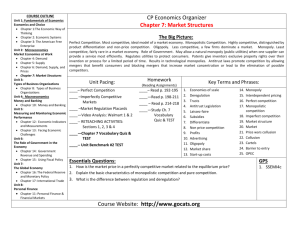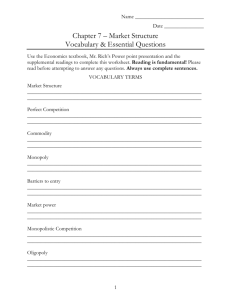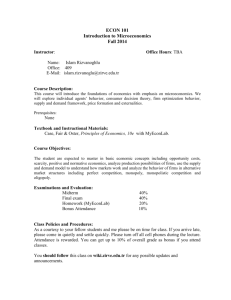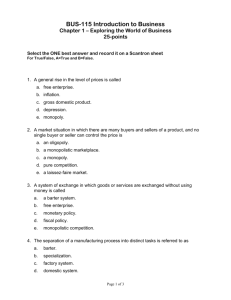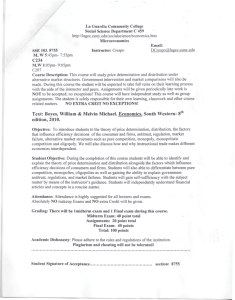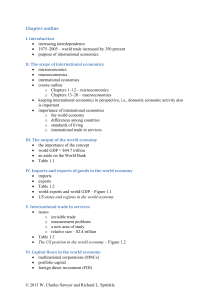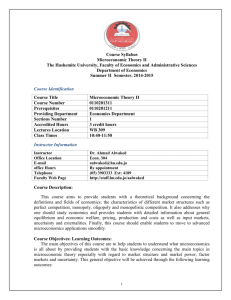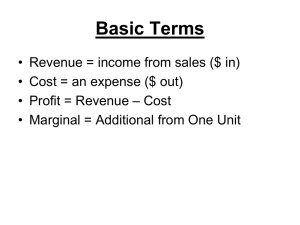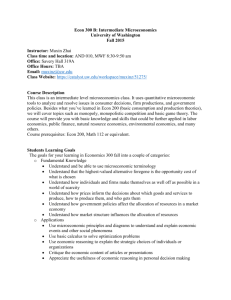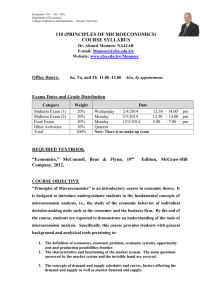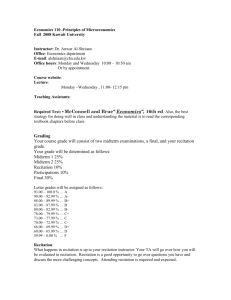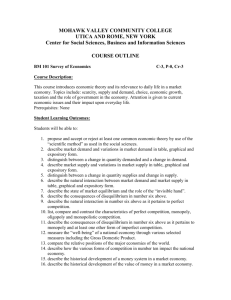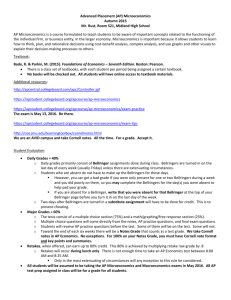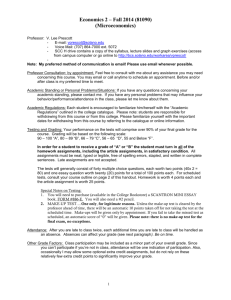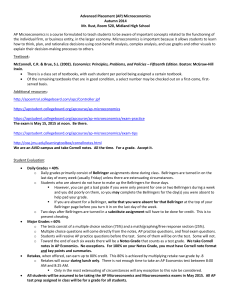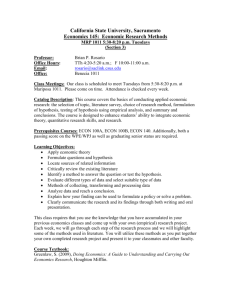Click here to view syllabus - LaGuardia Community College
advertisement
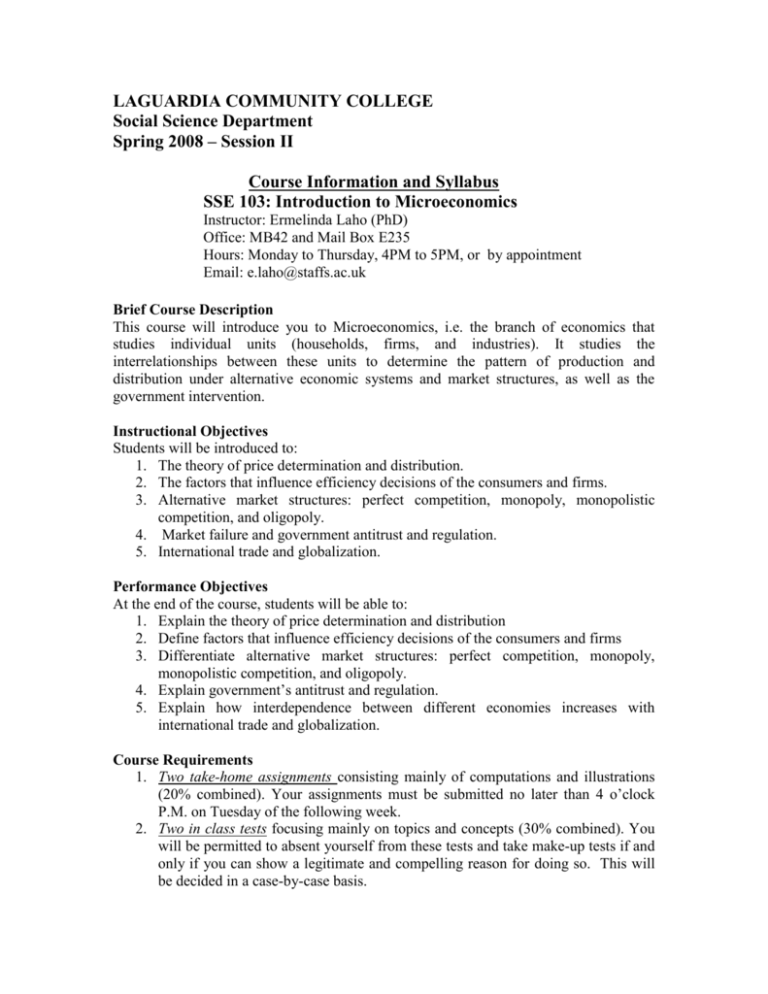
LAGUARDIA COMMUNITY COLLEGE Social Science Department Spring 2008 – Session II Course Information and Syllabus SSE 103: Introduction to Microeconomics Instructor: Ermelinda Laho (PhD) Office: MB42 and Mail Box E235 Hours: Monday to Thursday, 4PM to 5PM, or by appointment Email: e.laho@staffs.ac.uk Brief Course Description This course will introduce you to Microeconomics, i.e. the branch of economics that studies individual units (households, firms, and industries). It studies the interrelationships between these units to determine the pattern of production and distribution under alternative economic systems and market structures, as well as the government intervention. Instructional Objectives Students will be introduced to: 1. The theory of price determination and distribution. 2. The factors that influence efficiency decisions of the consumers and firms. 3. Alternative market structures: perfect competition, monopoly, monopolistic competition, and oligopoly. 4. Market failure and government antitrust and regulation. 5. International trade and globalization. Performance Objectives At the end of the course, students will be able to: 1. Explain the theory of price determination and distribution 2. Define factors that influence efficiency decisions of the consumers and firms 3. Differentiate alternative market structures: perfect competition, monopoly, monopolistic competition, and oligopoly. 4. Explain government’s antitrust and regulation. 5. Explain how interdependence between different economies increases with international trade and globalization. Course Requirements 1. Two take-home assignments consisting mainly of computations and illustrations (20% combined). Your assignments must be submitted no later than 4 o’clock P.M. on Tuesday of the following week. 2. Two in class tests focusing mainly on topics and concepts (30% combined). You will be permitted to absent yourself from these tests and take make-up tests if and only if you can show a legitimate and compelling reason for doing so. This will be decided in a case-by-case basis. 3. The final exam covering all the specified chapters and lectures (45%). 4. Class participation is not the same as class attendance. Each one of you will be expected to interest yourself and to participate actively in classroom discussions. The 5% grade that attaches to this requirement could make a considerable difference to your overall grade for the course. 5. Class attendance is considered very important, since class discussions often illuminate materials in ways other than the textbook presentation and are often occasions where the major points of the course are related to one another. Please note that this requirement is considered so important that more than two (2) unexcused absences during the quarter will constitute a reduction of one’s grade by one full grade. 6. The letter grades will be assigned on the basis of 95+ = A; 90-94 = A-; 86-89 = B+; 85 = B; 80-84 = B-; 76-79 = C+; 75 = C; 70-74 = C-; 66-69 = D+; 65 = D; 60-64 = D-; 00-59 = F. Course Policies Late assignment policy: Penalties apply for late submission of the assignments (2% of the total grade per day – so, for instance, if you submit your take-home assignment one day late, it will be evaluated against a maximum of 8% rather than the original 10%). No assignment will be accepted more than 5 days after it was originally due. Cheating and Plagiarism Cheating and plagiarism are extremely serious offenses in all academic areas (consult the College’s Catalog for the definition of Academic Dishonesty). You must not think you will be able to get away with cheating and plagiarism (in ninety-nine cases out of a hundred, you will be found out). Noisy devices All instruments, including but not limited to cell-phones, which make irritating noises must be turned off before you enter the classroom. This is a non-negotiable rule. Welcome to SSE 103! COURSE OUTLINE INTRODUCTION TO MICROECONOMICS Text : Economics, Seventh edition , Boyes and Melvin Also, consult the following websites: http://www.lagcc.cuny.edu/socialscience/micro.html http://www.college.hmco.com/economics/students/ WEEK 1,2 Unit I: Introduction to the Price System Chapter 1: What is Economics? Chapter 3: Markets, demand, Supply, and the Price System. Chapter 4: Market System and the Private Sector. WEEK 2,3,4 Unit II: Consumers and Firms Chapter 20: Elasticity: Demand and Supply. Chapter 21: Consumer Choice Chapter 22: Supply and Cost Theory. Chapter 23: Profit Maximization WEEK 5,6 Unit III: Imperfect Competition Chapter 24: Perfect Competition Chapter 25: Monopoly Chapter 26: Monopolistic Competition and Oligopoly Chapter 27: Antitrust and regulations WEEK 6 Unit IV: Different economics and International Trade Chapter 19: Globalization Chapter 36: International Trade Restrictions
